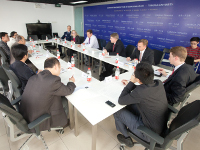Registration
You will receive an email confirming your registration.
IMGXYZ3511IMGZYXSouth Asia’s close proximity to East Asia, combined with security interests in Afghanistan and Pakistan, place it in a geopolitically significant position for both China and the United States. Greater communication between China and the United States on South Asia is essential, especially given growing bilateral frictions resulting from shifts in U.S. policies toward India, Pakistan, and Afghanistan. In the tenth installment of the China-South Asia Dialogues Seminar Series, the Carnegie-Tsinghua Center for Global Policy hosted a group of U.S. and Chinese security experts in a roundtable setting to discuss avenues for expanded consultations on South Asia. Carnegie’s Lora Saalman moderated this event.
Engaging and Stabilizing Pakistan
One U.S. participant discussed counter-insurgency efforts in Afghanistan, asserting that there has been a decrease in violence due to these efforts. At the same time, he lamented the growth of extremism in Pakistan, citing the following issues:
- Civil-Military Tension: Civil-military tension has enabled extremist political parties to grow in power, the participant said. He highlighted the overall lack of accountability in ensuring that government officials are dealing with civilians’ needs, exacerbated by the erosion of socio-economic indicators due to inadequate funding in education and medicine.
- Ineffective Governance: The Pakistani government has been unable to maintain sovereignty and control over certain areas in Pakistan, explained another U.S. participant. It faces a legitimacy crisis, he argued. Even in areas of relative stability, lack of foreign investment has resulted in a growing unemployment rate, particularly among Pakistani youth.
- Cross-border Violence: It has been a matter of state policy for Pakistan’s military and intelligence community to cultivate extremist groups as proxies, resulting in instability bleeding outward, according to one U.S. participant. This has not been unidirectional, as Pakistan’s preoccupation with India has hindered it from devoting greater attention to internal stability.
Pakistan’s Concerns
A Chinese expert noted Pakistani concerns about India’s participation in regional security structures, such as the Afghanistan-India strategic dialogue. The scholar asked whether or not the United States seeks to strengthen India’s regional leverage. A U.S. participant responded by highlighting India’s historical non-alignment policy. He emphasized that the Indo-Afghanistan strategic dialogue does not represent a sea change in India’s engagement policy or a threat to Pakistan.
China’s Active Role
Given China’s shared borders with Pakistan and the region, one U.S. expert argued that it is in Chinese and U.S. interests to recognize their mutual security concerns, such as curbing extremism and stabilizing Pakistan. One of the Chinese panelists responded that there is not a strong concern within China over the future of Pakistan. Pakistan had always been faced with instability and internal pressures, argued this scholar. The U.S. attendee responded by expressing hope that China would exert a more active and stabilizing influence when it comes to Pakistan and Afghanistan. Saalman asked what kind of role the United States sees China playing. A U.S. expert suggested that China’s incentives and mode of engagement could include:
- Economics: China, given its appetite for resources, has a natural inclination to better engage and stabilize Afghanistan and Pakistan. These two countries represent both a source and conduit of resources for China. Chinese demand for raw materials would bolster Afghanistan and Pakistan’s respective economies, otherwise ravaged by mismanagement.
- Access: Pakistan’s development and stability would facilitate China’s linkage to the Arabian Sea and Karakoram highway. Such pathways are crucial for China’s ongoing economic development and growth. These regions would also benefit from a stronger Chinese presence.
- Afghanistan: Another U.S. expert argued that it is not in China’s interest to have Afghanistan ruled by the Taliban. He suggested that the new generation of the Taliban contrasts with its previous incarnation. Due to its association with al-Qaeda, the Taliban has become more radicalized, with external ambitions that could threaten China and its domestic and foreign interests.
The Chinese panelists characterized the South Asian arenas in which increased cooperation is most needed as including:
- Curbing South China Sea and Indian Ocean piracy
- Engaging in counterterrorism
- Coordination in the medical field
- Promotion of measures against climate change
- Supporting Afghanistan reconstruction and Pakistan development via education and economic growth
Pakistan and Afghanistan
One of the Chinese experts asked whether the United States continues to think that Pakistan can exert a positive influence over Afghanistan’s transition. A U.S. attendee responded that after the U.S. military operation against Osama bin Laden, the popularity of Pakistan’s government precipitously declined. In response, Pakistan’s government worked quickly to undermine claims that the operation revealed weaknesses on the part of its military. These efforts have exacerbated anti-American sentiment, the U.S. participant explained. He added that this popularity is fragile and does not allow the Pakistani military much room to maneuver.
U.S.-India-China
One U.S. participant stated that the United States has had an easier time cooperating with India than with China, due to greater political and legal comity. However, he argued that China is not a primary factor in the Indo-U.S. relationship. Instead, India has the potential to serve as a regional “net security provider,” noted this expert. Another Chinese panelist stressed that he also remains optimistic about U.S.-China-India relations, although he argued that China is currently a looming factor in U.S.-India ties. In order to diminish this imbalance, he suggested that the United States needs to increase its visits to both China and India to create a “win-win-win” dynamic between the three.
Discussants: Cheng Ruisheng, Ma Jiali, Chen Zonghai, Ren Jingjing, Zhong Zhong, Mao Jikang, Yang Xiaoping, Song Haixiao, Lin Yunzhi, Peter Lavoy, David Helvey, David Stilwell, Cole Shepherd, William Flens, Brett Blackshaw
